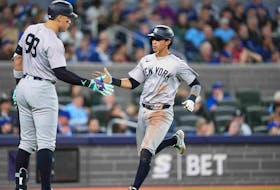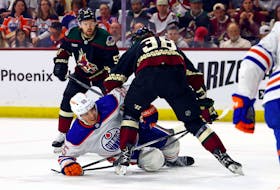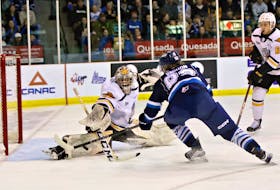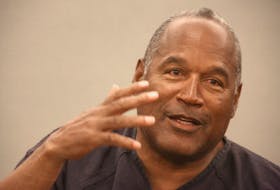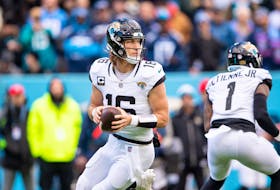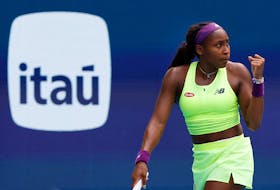Masai Ujiri says he was having trouble sleeping.
This was last month, after the Toronto Raptors president had been publicly vindicated with the release of video footage that showed an Oakland-area sheriff’s deputy shoving him aggressively in the minutes following his team’s NBA championship win in the spring of 2019. The police officer who had been working security at Oracle Arena had sued Ujiri, claiming all sorts of mental and physical distress over the brief confrontation, but the video evidence showed Ujiri could only have harmed the deputy had he been wearing a suit made of spikes.
When the footage came out as part of legal proceedings, Ujiri was with the Raptors in the NBA’s Orlando bubble, sequestered in hotels at Walt Disney World.
“You have a lot of time to think,” he said on Thursday, in a season-ending video call with media. “What if this had gone the total wrong way?” What if there wasn’t an arena full of witnesses? What if Kyle Lowry hadn’t interceded to pull Ujiri away from the heated situation? “Maybe I would have acted a little differently,” Ujiri said. “Then it starts to mess with your mind.”
He didn’t need to explain where the rest of that what-if thinking would lead.
When the NBA touched down in Florida in June to finish a pandemic-interrupted season, it was already doing so against the backdrop of the death of George Floyd in Minnesota, and the anti-racism movement that incident sparked across the world. The players and the league agreed on using the platform of resumed competition to promote social-justice causes. Players wore slogans on their jerseys, and Black Lives Matter took the spot of valuable advertising on the courts. Amid all that, the Ujiri evidence came out, showing a law-enforcement confrontation with a Black man that was not at all as it had been described by those charged with upholding the law.
Alone in his hotel room, Ujiri says the experience made him consider how it might have otherwise turned out.
“For me, at the end of the day, I’m privileged,” he said. Indeed, from the moment of the incident, Ujiri has been supported by his employer and had a legal team at his disposal. “I’m able to face this square-on,” he said. “I just started to think about the people who cannot. They have things that happen where there are no cameras, where there is no video…How do these people who get incarcerated, who get wrongfully accused — that began to bug me as a person. And I struggled in the bubble thinking about all this.”
Ujiri’s awareness of his own position is not a small point. He makes a lot of money, is one of the most highly regarded executives in the NBA, and has palled around with former presidents and current prime ministers. And when he was about to take the court for a trophy presentation, he came across someone whose first instinct was to shove him, and later sued him over the encounter.
It made him realize that the truth doesn’t always win out in these encounters.
“I watch all these movies, I watch all these documentaries, and I’m thinking, ‘man, why don’t you just say what happened? Just say exactly what happened and you’ll be fine.’”
Then something happened to him. “And I began to question myself, I began to doubt myself.” You start to wonder, he said, if your own memories could be trusted.
I’m able to face this square-on.I just started to think about the people who cannot
Those issues would come up again not long after Ujiri’s story became headline news, with the shooting of Jacob Blake in Wisconsin, and the protests that it touched off. The Raptors and the Boston Celtics, then preparing to begin a second-round playoff series, were the first teams to publicly float the idea of sitting out games to press for change.
“We talked about everything that was going on,” says Ujiri. The players had arrived hoping to spread a message about racial injustice, and then it was all happening again. “These are things that piled on, and you could tell there was a mental drain on these players,” he said. It was time for a pause, even a brief one. He said he was proud that the league had agreed to certain initiatives — money for anti-racism messaging, a voter-registration drive — before play resumed.
Ujiri answered questions for the better part of an hour on Thursday, and his basketball-related thoughts were fairly mundane. He’s proud of his team, he loves his players, he wants to bring everyone back if he can. He even talked up Pascal Siakam, who had a great season but in the bubble played with all the grace of a newborn foal.
But the one time he really warmed to the topic was on the importance of continuing to press for societal change. He talked about trying to understand racism, in order to better combat it. It was here that Ujiri’s voice started to rise, started to pick up a familiar cadence that he breaks out when he wants to make a point.
“We have to fight this fight,” he said. “It starts with voting. We cannot be afraid. A lot of leaders are afraid to speak their mind. We all know what the issue is,” he said, his finger wagging in the air at this point. You did not have to be a keen student of U.S. politics to know what he meant.
“The issue is leadership,” Ujiri said. “We all need to go out and vote, and make the change that should happen, and we go from there.”
• Email: [email protected] | Twitter: scott_stinson
Copyright Postmedia Network Inc., 2020


